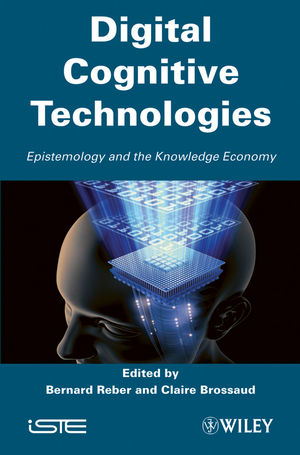Digital Cognitive Technologies: Epistemology and Knowledge SocietyISBN: 978-1-84821-073-8
Hardcover
416 pages
May 2010, Wiley-ISTE
 |
||||||
Foreword xv
Dominique BOULLIER
Introduction xxi
Claire BROSSAUD and Bernard REBER
PART I. CAN ICT TELL HISTORY? 1
Chapter 1. Elements for a Digital Historiography 3
Andrea IACOVELLA
Chapter 2. “In Search of Real Time” or Man Facing
the Desire and Duty of Speed 23
Luc BONNEVILLE and Sylvie GROSJEAN
Chapter 3. Narrativity Against Temporality: a Computational
Model for Story Processing 37
Eddie SOULIER
PART II. HOW CAN WE LOCATE OURSELVES WITHIN ICT? 57
Chapter 4. Are Virtual Maps used for Orientation?
59
Alain MILON
Chapter 5. Geography of the Information Society 71
Henry BAKIS and Philippe VIDAL
Chapter 6. Mapping Public Web Space with the Issuecrawler
89
Richard ROGERS
PART III. ICT: A WORLD OF NETWORKS? 101
Chapter 7. Metrology of Internet Networks 103
Nicolas LARRIEU and Philippe OWEZARSKI
Chapter 8. Online Social Networks: A Research Object for
Computer Science and Social Sciences 119
Dominique CARDON and Christophe PRIEUR
Chapter 9. Analysis of Heterogenous Networks: the ReseauLu
Project 137
Alberto CAMBROSIO, Pascal COTTEREAU, Stefan POPOWYCZ, Andrei
MOGOUTOV and Tania VICHNEVSKAIA
PART IV. COMPUTERIZED PROCESSING OF SPEECHES AND HYPERDOCUMENTS: WHAT ARE THE METHODOLOGICAL CONSEQUENCES? 153
Chapter 10. Hypertext, an Intellectual Technology in the Era
of Complexity 155
Jean CLÉMENT
Chapter 11. A Brief History of Software Resources for
Qualitative Analysis 169
Christophe LEJEUNE
Chapter 12. Sea Peoples, Island Folk: Hypertext and Societies
without Writing 187
Pierre MARANDA
PART V. HOW DO ICT SUPPORT PLURALISM OF INTERPRETATIONS? 203
Chapter 13. Semantic Web and Ontologies 205
Philippe LAUBLET
Chapter 14. Interrelations between Types of Analysis and
Types of Interpretation 219
Karl M. VAN METER
Chapter 15. Pluralism and Plurality of Interpretations
231
François DAOUST and Jules DUCHASTEL
PART VI. DISTANCE COOPERATION 245
Chapter 16. A Communicational and Documentary Theory of ICT
247
Manuel ZACKLAD
Chapter 17. Knowledge Distributed by ICT: How do
Communication Networks Modify Epistemic Networks? 265
Bernard CONEIN
Chapter 18. Towards New Links between HSS and Computer
Science: the CoolDev Project 283
Grégory BOURGUIN and Arnaud LEWANDOWSKI
PART VII. TOWARDS RENEWED POLITICAL LIFE AND CITIZENSHIP 299
Chapter 19. Electronic Voting and Computer Security
301
Stéphan BRUNESSAUX
Chapter 20. Politicization of Socio-technical Spaces of
Collective Cognition: the Practice of Public Wikis 317
Serge PROULX and Anne GOLDENBERG
Chapter 21. Liaising using a Multi-agent System 331
Maxime MORGE
PART VIII. IS “SOCIO-INFORMATICS” POSSIBLE? 343
Chapter 22. The Interdisciplinary Dialog of Social
Informatics 345
William TURNER
Chapter 23. Limitations of Computerization of Sciences of Man
and Society 357
Thierry FOUCART
Chapter 24. The Internet in the Process of Data Collection
and Dissemination 373
Gaël GUEGUEN and Saïd YAMI
Conclusion 389
Bernard REBER and Claire BROSSAUD
Postscript 397
Roberto BUSA
List of Authors 401
Index 405



